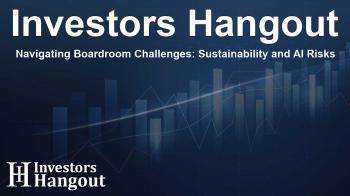Navigating Boardroom Challenges: Sustainability and AI Risks

Exploring the Evolving Role of Boards in Sustainability and AI
Recent findings from a global survey illustrate that many boards are increasingly confident about their role in promoting sustainability. However, there remains significant uncertainty regarding key issues like the impact of generative AI and geopolitical disruptions. In collaboration with prominent thought leaders from Heidrick & Struggles, Boston Consulting Group, and the INSEAD Corporate Governance Centre, this report sheds light on the intricate dynamics at play in boardrooms worldwide.
Key Insights from the Boardroom Survey
The report highlights that 77% of board members acknowledge their responsibility in addressing sustainability challenges. Despite this growing recognition, there is a stark contrast in preparedness to leverage new technologies. Only 36% of directors feel equipped to harness the transformative potential of AI, while just 37% self-report having robust strategies to mitigate geopolitical risks.
Confidence Levels Among Leadership
Interestingly, the survey reveals a troubling lack of confidence within leadership teams. Nearly 29% of directors harbor doubts about their CEOs' abilities to steer their companies through times of uncertainty. Simultaneously, 26% of CEOs express skepticism about the leadership effectiveness of their boards. This disconnect can hinder strategic alignment and limit organizations' capabilities to respond to complex challenges.
The Need for Enhanced Governance Strategies
As boards face an array of emerging threats, from sustainability to technology disruptions, there is an urgent need for governance frameworks that foster proactive engagement rather than reactive measures. The unsettling statistic that approximately half of the surveyed directors doubt their firms' preparedness for recognizing new threats further underscores this need.
Balancing Traditional Governance with Innovative Strategies
Boards must strike a harmonious balance between conventional governance protocols and forward-looking strategies that promote investment in competencies. Over 60% of surveyed directors indicated they are 'leaning in' on risk management, highlighting a desire to embrace challenges head-on, signaling a readiness to evolve in response to market dynamics.
Industry Experts Weigh In
Jeremy Hanson, a Partner at Heidrick & Struggles and co-author of this insightful report, remarked on the emerging tensions between boards and management. He emphasized, "Alignment between board directors and management isn't just a best practice; it’s essential for addressing both today's challenges and future complexities. Constructive debate and open conversations within boardrooms are vital for reaching well-rounded decisions in an increasingly demanding environment."
Proactivity in Board Governance
Sonia Tatar, Executive Director at the INSEAD Corporate Governance Centre, added that boards can significantly improve by transitioning from reactive to proactive stances. By anticipating potential disruptions, they are better positioned to leverage emerging trends into actionable strategies that enhance company resilience.
Challenges Ahead, but Opportunities Remain
David Young from the Boston Consulting Group shared insights on the evolving landscape facing boards. He noted, "As geopolitical occurrences, rapid technological advancements, and environmental concerns intensify, the onus is on boards to deepen their engagement with executive teams. The strides made in sustainability practices present opportunities now, more than ever."
Final Thoughts on Boardroom Adaptations
In conclusion, the report underscores a compelling narrative about the evolving challenges boards confront amidst sustainability imperatives and technological disruptions. The insights shared reflect the urgent need for cohesion, collaboration, and a shared vision to thrive in an uncertain future. Boards that can navigate this turbulent terrain will not only manage risks more effectively but will also position their organizations to capitalize on future growth opportunities.
Frequently Asked Questions
What are the main findings of the global boardroom survey?
The survey indicates that while there is a strong belief in addressing sustainability, many boards lack confidence in leveraging AI and managing geopolitical risks.
What percentage of directors feel prepared to use AI?
Only 36% of directors feel adequately prepared to leverage the disruptive potential of AI in their strategies.
Is there tension between board members and CEOs?
Yes, the survey reveals that 29% of directors lack confidence in their CEOs' abilities, while 26% of CEOs are skeptical of their board's effectiveness.
How can boards improve their governance strategies?
By fostering greater alignment with management, encouraging proactive engagement, and enhancing competency in understanding emerging complexities.
Why is sustainability a key focus for boards currently?
With 77% of directors acknowledging their responsibility towards sustainability, it has become a central theme amidst rising societal expectations and environmental challenges.
About Investors Hangout
Investors Hangout is a leading online stock forum for financial discussion and learning, offering a wide range of free tools and resources. It draws in traders of all levels, who exchange market knowledge, investigate trading tactics, and keep an eye on industry developments in real time. Featuring financial articles, stock message boards, quotes, charts, company profiles, and live news updates. Through cooperative learning and a wealth of informational resources, it helps users from novices creating their first portfolios to experts honing their techniques. Join Investors Hangout today: https://investorshangout.com/
Disclaimer: The content of this article is solely for general informational purposes only; it does not represent legal, financial, or investment advice. Investors Hangout does not offer financial advice; the author is not a licensed financial advisor. Consult a qualified advisor before making any financial or investment decisions based on this article. The author's interpretation of publicly available data shapes the opinions presented here; as a result, they should not be taken as advice to purchase, sell, or hold any securities mentioned or any other investments. The author does not guarantee the accuracy, completeness, or timeliness of any material, providing it "as is." Information and market conditions may change; past performance is not indicative of future outcomes. If any of the material offered here is inaccurate, please contact us for corrections.
